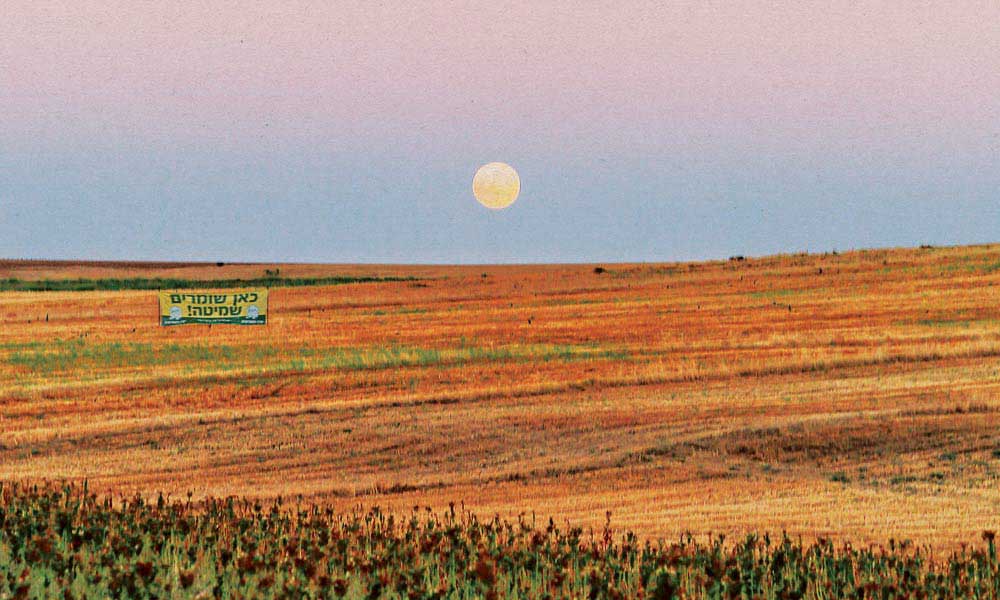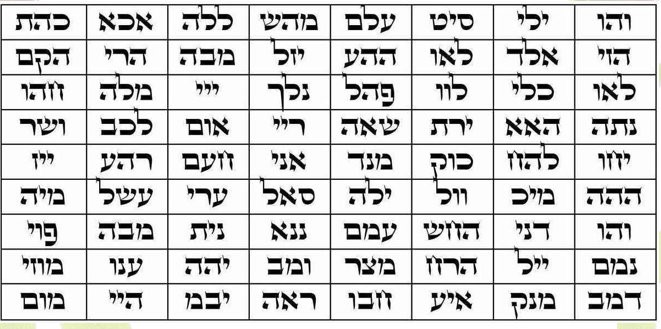BS”D
Sukkah 44b – 45a
Mar-Cheshvan 20, 5783. November 15, 2022
1- We discussed the story concerning the righteous fellow that asked Reb Elazar that villagers come and hoe his vineyard during Shmittah and eat from the olive grove. Meaning that he is using grapes of Shmittah to pay for their work on the olive trees. לכם לאכלה ולא לסחורה.

Is it appropriate or inappropriate?

When he was told not to do it, he left immediately and received praise from Reb Elazar.
“I have resided in this land for forty years and I have not seen a person walk in a path as straight as this man does”.

What was so great about this man? He heard a פסק דין and left. How does that reflect on his greatness?
The ערוך לנר suggests that the fact that this person left immediately, without even saying the appropriate goodbye, shows his concern for the workers on his property. He hurried to tell them to stop taking olives as payment so as not to transgress the prohibition of doing ‘business’ with פירות שביעית.

2 – We had an issue about the next instructions given to this fellow:
Declare the olives ownerless for the poor (be מפקיר), and pay perutot coins (cash) to the laborers as payment to hoe the grapes groves.
There is a Mitzvah for everyone to be מפקיר his produce at the beginning of Shmittah So why did this fellow need to do it again?
In passing we mentioned the famous argument 450 or so years ago between Reb Yosef Karo and the Mabit – Reb Moshe di Trani: Is this הפקר is an active commandment and happens only when one is actually מפקיר, or if it happens automatically. The difference is if one did not do it – is it הפקר or not? Also – in the case of a field of a goy.
See here if the obligation to be מפקיר applies just on the produce or on the actual field itself.

3- Based on the next piece of Gemara, we mentioned the Halachah (OC 249) that one is not allowed to begin a journey on Friday morning that will take more than 4 hours or so.

The reason is that by limiting the journey’s time, we are ensuring that his arrival at his destination to allow him enough time (the balance of ⅔ of the day) to prepare for the Shabbos meal.
If he leaves early in the morning and travels just 4 +- hours, the day will still have plenty of hours (8 +-) for Shabbos preparation.

כסא דהרסנא
The concern is that people need to be prepare for the Shabbos meal. Thus, when he arrives at his destination late on Friday he will not have time or ingredients to cook for Shabbos.
That would apply even if one is returning from a trip and heading to his own home!

The reason is that perhaps his wife and children don’t have or didn’t prepare enough food to feed him. His arrival and the lack of food for him, will cause strife in his home. “Tatty, why didn’t you tell us you’re coming home”……..

However, there are exceptions to this rule and in general this Halachah does not apply today since BH, we are blessed with an abundance of food and the arrival of one more person will not cause anyone to go hungry.

Mentioned the story of Reb Yisroel Labkowski, a true ירא שמים, who packed חלות and wine when he left the mountains to Crown Heights late one Friday afternoon.

R. Yisroel, 2nd from L.,
4- We came across the two rows of benches that surrounded the בית המקדש and the cover above them. Since one could not carry his Lulav on Shabbos, people would bring them on Friday and place them on these benches.
5- Daf 45a. Famous for (probably) being the only place in Sha”s that Rashi writes something of קבלה.
The Mishnah says:
דֵּי הַמִּזְבֵּחַ, וְרָאשֵׁיהֶן כְּפוּפִין עַל גַּבֵּי הַמִּזְבֵּחַ. תָּקְעוּ וְהֵרִיעוּ וְתָקְעוּ. בְּכׇל יוֹם מַקִּיפִין אֶת הַמִּזְבֵּחַ פַּעַם אַחַת וְאוֹמְרִים: ״אָנָּא ה׳ הוֹשִׁיעָה נָּא, אָנָּא ה׳ הַצְלִיחָה נָּא״. רַבִּי יְהוּדָה אוֹמֵר: ״אֲנִי וָהוּ הוֹשִׁיעָה נָא״.
Now what does אֲנִי וָהוּ mean?
We discussed the opinion of Rashi, Tosfos and the Rambam.
Rashi:
אני והו – בגימטריא אנא ה’
ועוד משבעים ושתים שמות הן הנקובים בשלש מקראות הסמוכין בפרשת ויהי בשלח ויסע וגו’ ויבא בין מחנה ויט משה את ידו ושלשתן בני שבעים ושתים אותיות ומהן שם המפורש אות ראשונה של פסוק ראשון ואחרונה של אמצעי וראשונה של אחרון וכן בזה הסדר כולן השם הראשון והו וי”ו של ויסע ה”א דכל הלילה וי”ו דויט ושם השלשים ושבע הוא אני אל”ף דמאחריהם ונו”ן ראשון דהענן בחשבון של מפרע ויו”ד דרוח קדים:
Rashi is saying that אֲנִי וָהוּ symbolizes Hashem’s name that contains 72 letters.
We know it as שם ע”ב.
He goes on to explain at length the basis of this 72 lettered name and the אֲנִי וָהוּ.
This is a very deep and wide topic as explained in קבלה, חסידות and the works of Reb Levi’k. In the next few shiurim we will bl”n try to add more to this interesting phenomenon.
- Why the right to left, left to right and finally right to left again.
- Why אני (box 37) before והו (box 1).
- Why no letter גימל in the 3 פסוקים.
- בכן which equals 72 . Said 3 times on ראש השנה ויוה”כ correspond to the 3 פסוקים with 72 letters.
- What about the בכן? Rebbe’s heart rending Sicha Purim תשי”א.
- More.
אני והו
רש”י
שמות יד, יט – כא
וַיִּסַּ֞ע מַלְאַ֣ךְ הָאֱלֹהִ֗ים הַהֹלֵךְ֙ לִפְנֵי֙ מַחֲנֵ֣ה יִשְׂרָאֵ֔ל וַיֵּ֖לֶךְ מֵאַחֲרֵיהֶ֑ם וַיִּסַּ֞ע עַמּ֤וּד הֶֽעָנָן֙ מִפְּנֵיהֶ֔ם וַיַּֽעֲמֹ֖ד מֵאַחֲרֵיהֶֽם׃
The messenger of God, who had been going ahead of the Israelite army, now moved and followed behind them; and the pillar of cloud shifted from in front of them and took up a place behind them.
וַיָּבֹ֞א בֵּ֣ין מַחֲנֵ֣ה מִצְרַ֗יִם וּבֵין֙ מַחֲנֵ֣ה יִשְׂרָאֵ֔ל וַיְהִ֤י הֶֽעָנָן֙ וְהַחֹ֔שֶׁךְ וַיָּ֖אֶר אֶת־הַלָּ֑יְלָה וְלֹא־קָרַ֥ב זֶ֛ה אֶל־זֶ֖ה כׇּל־הַלָּֽיְלָה׃
And it came between the army of the Egyptians and the army of Israel. Thus there was the cloud with the darkness, and it cast a spell upon the night, so that the one could not come near the other all through the night.
וַיֵּ֨ט מֹשֶׁ֣ה אֶת־יָדוֹ֮ עַל־הַיָּם֒ וַיּ֣וֹלֶךְ יְהֹוָ֣ה אֶת־הַ֠יָּ֠ם בְּר֨וּחַ קָדִ֤ים עַזָּה֙ כׇּל־הַלַּ֔יְלָה וַיָּ֥שֶׂם אֶת־הַיָּ֖ם לֶחָרָבָ֑ה וַיִּבָּקְע֖וּ הַמָּֽיִם
Then Moses held out his arm over the sea and Hashem drove back the sea with a strong east wind all that night, and turned the sea into dry ground. The waters were split.
זוהר שמות ע’ ע”ר

Tosfos and the Ramban have a different explanation to the meaning of אֲנִי וָהוּ.
תוספות
יחזקאל א, א
וַיְהִ֣י בִּשְׁלֹשִׁ֣ים שָׁנָ֗ה בָּֽרְבִיעִי֙ בַּחֲמִשָּׁ֣ה לַחֹ֔דֶשׁ וַאֲנִ֥י בְתֽוֹךְ־הַגּוֹלָ֖ה עַל־נְהַר־כְּבָ֑ר נִפְתְּחוּ֙ הַשָּׁמַ֔יִם וָאֶרְאֶ֖ה מַרְא֥וֹת אֱלֹהִֽים׃
In the thirtieth year on the fifth day of the fourth month, when I was in the community of exiles by the Chebar Canal, the heavens opened and I saw visions of God.
ירמיהו מ, א
הַדָּבָ֞ר אֲשֶׁר־הָיָ֤ה אֶֽל־יִרְמְיָ֙הוּ֙ מֵאֵ֣ת יְהֹוָ֔ה אַחַ֣ר שַׁלַּ֣ח אֹת֗וֹ נְבוּזַרְאֲדָ֛ן רַב־טַבָּחִ֖ים מִן־הָרָמָ֑ה בְּקַחְתּ֣וֹ אֹת֗וֹ וְהֽוּא־אָס֤וּר בָּֽאזִקִּים֙ בְּת֨וֹךְ כׇּל־גָּל֤וּת יְרוּשָׁלַ֙͏ִם֙ וִֽיהוּדָ֔ה הַמֻּגְלִ֖ים בָּבֶֽלָה׃
The word that came to Jeremiah from the LORD, after Nebuzaradan, the chief of the guards, set him free at Ramah, to which he had taken him, bonded in chains, among those from Jerusalem and Judah who were being exiled to Babylon.
רמב”ם
דברים לב, לט
עַתָּ֗ה כִּ֣י אֲנִ֤י אֲנִי֙ ה֔וּא וְאֵ֥ין אֱלֹהִ֖ים עִמָּדִ֑י אֲנִ֧י אָמִ֣ית וַאֲחַיֶּ֗ה מָחַ֙צְתִּי֙ וַאֲנִ֣י אֶרְפָּ֔א וְאֵ֥ין מִיָּדִ֖י מַצִּֽיל׃ רְא֣וּ
See, then, that I, I am the One There is no god beside Me I deal death and give life
I caused a wound and I will heal. None can deliver from My hand.
6- The Mishnah concludes that as soon as the הושענא process was completed the adults ‘grabbed the Esrogim from the children’s hands and bit into them!’

Rashi explains that there is no issue with גזילה here since it was done as part of the festivities.
Tosfos derives from רש”י that this concept is not limited to הושענא רבה but to other occasions as well. When being joyous and playful the laws of גזילה and מזיק do not apply.
As an example they bring the custom (apparently popular at the time) of entertaining a חתן by jousting, obviously in a theatrical manner. Despite clothes being torn and damage to the horses , there was no concern for the גזילה that seemed to happen. . .

ומסיימין בטוב.